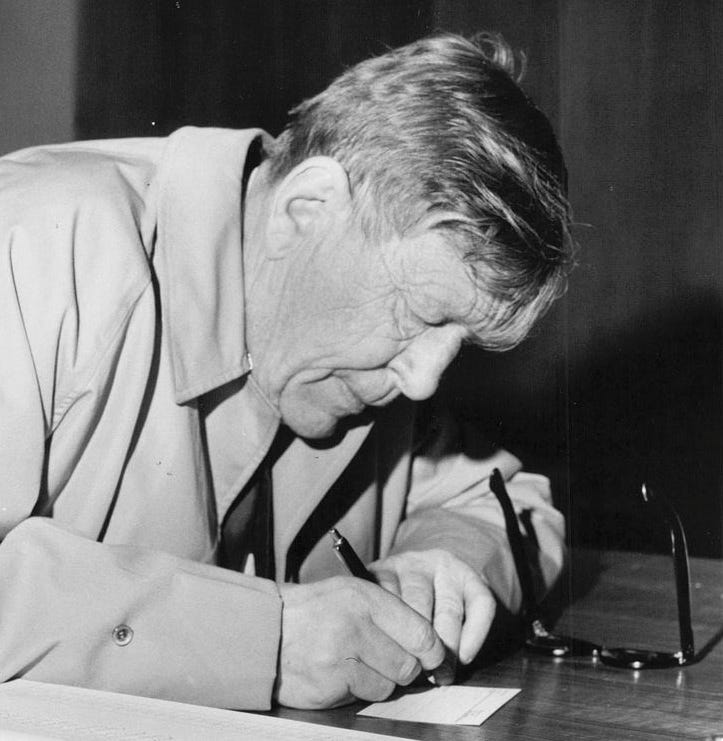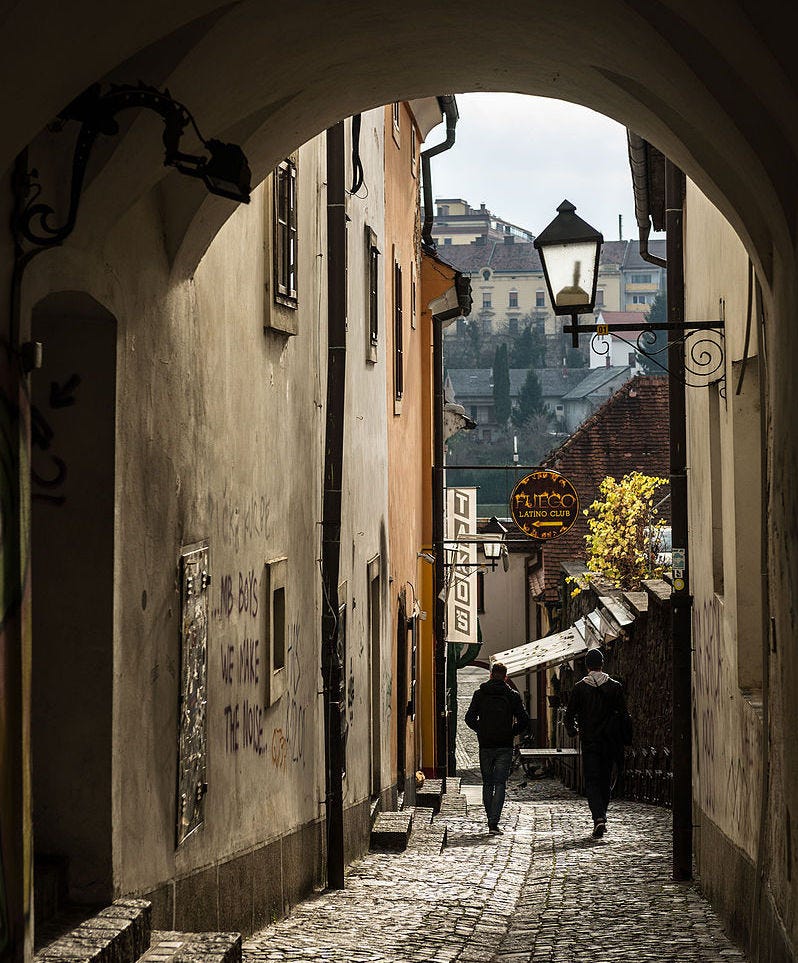A Few Thoughts on W. H. Auden’s Line “Poetry Makes Nothing Happen”
Also: Recovering Francesco Patrizi, small Roman dogs, bringing back the woolly mammoth, pubic radio in decline, and more.

W. H. Auden wrote famously in “In Memory of W. B. Yeats” that “poetry makes nothing happen,” other than itself, of course, which is not nothing. This is often ignored in glosses on the line, but it’s important. In the poem, Auden compares the poetry of Yeats to a river. It “survives,” he writes
In the valley of its making where executives
Would never want to tamper, flows on south
From ranches of isolation and the busy griefs,
Raw towns that we believe and die in; it survives,
A way of happening, a mouth.
We might say that the valley is the poet’s imagination. The water is language. The river—the poem—is a thing of power and beauty whose thingness is found in the shape that the “valley of its making” gives to the water. The river runs through “ranches of isolation” and “Raw towns that we believe and die in,” but it doesn’t change these places. It doesn’t make the ranches less isolated or the towns more civilized.
Auden, of course, is aware that most of the great cities of Europe were founded next to rivers or mouths of rivers—Rome, Florence, Istanbul, Paris, London, Budapest, Vienna, Lisbon—in part because of the nourishment and means of transportation that rivers provided. But the purpose of a river is not to build a great city or a great civilization. The purpose of a river is simply to be a river, which, Auden writes, teaches us “to rejoice.” In what? He doesn’t say, but the fact that he uses an intransitive verb and does not provide a direct object seems to suggest that the river teaches us to rejoice in itself or, more precisely, in the “way” of its “happening,” which is to say in how it moves and reflects the light, in its colors and sounds, in its coolness or warmth, taken in all at once as a single and yet complex thing, formed out of the interaction between the valley (the poet’s mind) and water (words) without being reduced to either.
Auden doesn’t deny that rivers do all sorts of useful things. “With the farming of a verse,” he tells the poet, “Make a vineyard of the curse”: “In the deserts of the heart / Let the healing fountain start.” Yet, there’s no suggestion that poetry must—or will—do these things. After all, Auden wrote these lines in January 1939 when Europe was on the brink of war. Directly preceding them, he acknowledges the bleakness of the situation:
In the nightmare of the dark
All the dogs of Europe bark,
And the living nations wait,
Each sequestered in its hate;Intellectual disgrace
Stares from every human face,
And the seas of pity lie
Locked and frozen in each eye.
He hopes that poetry might feed some “pity,” might cause Europe to beat its weapons into ploughshares, but if poetry doesn’t do this—and Auden likely knew it wouldn’t—it doesn’t make it any less than what it is. It “survives” undiminished nonetheless.
Can poetry change us? Can poetry change society? Yes. Is its primary purpose to do so? No. These are secondary effects that it may or may not have depending on the contingent response of particular individuals at particular times. What poetry must do, however, is please by its articulation and form, and it is with respect to the quality of this articulation alone that it must be judged.
In other news, it has been discovered that metals can heal themselves: “The research team from Sandia National Laboratories and Texas A&M University described their findings today in the journal Nature. ‘This was absolutely stunning to watch first-hand,’ said Sandia materials scientist Brad Boyce. ‘What we have confirmed is that metals have their own intrinsic, natural ability to heal themselves, at least in the case of fatigue damage at the nanoscale,’ Boyce said.”
One of California’s oldest papers—the Santa Barbara News-Press—declares bankruptcy: “The newspaper became an online-only publication in April. But its last digital edition was posted Friday when owner Wendy McCaw filed for bankruptcy.”
Bringing back the woolly mammoth: “In 2021, Dr. Church co-founded Colossal Laboratories & Biosciences with Texas-based serial entrepreneur Ben Lamm. Their goals include not only “de-extincting” the woolly mammoth but also the dodo (which died out in 1662) and the Tasmanian tiger (the last known tiger passed away in captivity in Hobart in 1936), as well as working on wider nature conservation. The biotech company kicked off with $15 million in seed funding and just nineteen employees. Today, it has 107 employees and labs in Dallas, Boston and Melbourne, Australia.”
Tiny Roman dog remains found during dig: “An archaeological dig at Wittenham Clumps in Oxfordshire has uncovered the 1,800-year-old remains of a 20cm tall pooch. The animal’s remains were unearthed at the site of a villa believed to have been owned by a wealthy Roman family.”
Making record-collecting male: “Before World War I, there was nothing inherently masculine about recorded music, explains cultural historian Keir Keightley. But by the 1960s, ‘home audio sound reproduction equipment had hardened into masculinist technologies par excellence.’ The high-fidelity stereo, soon to be known as ‘the hi-fi,’ had become popular with the introduction of the long-playing records (LPs) in 1948. And while LPs weren’t marketed as masculine, hi-fis were. As Keightley notes, a 1953 Life magazine article explains that ‘[o]ne of the strangest facts about both [hi-fi] bugs and audiophiles is that they are almost exclusively male…women seldom like hi fidelity.’” I have no doubt that marketing played a role in making record-collecting a masculine hobby, but I am not sure it is the only reason men like to fiddle with mechanical things and exercise complete control over a fiefdom of records.
Amsterdam bans cruise ships: “Amsterdam’s city council has approved a proposal banning ‘polluting’ cruise ships as part of the city’s latest move to clamp down on overtourism. A spokesperson for Amsterdam Deputy Mayor Hester van Buren, who has responsibility for the city’s port, told CNN that the council approved a proposal on Thursday to close the city’s cruise ship terminal.”
In The Atlantic, Richard D. Kahlenberg writes about the invisible walls of liberal suburbia: “Across the country, a lot of good white liberals, people who purchase copies of White Fragility and decry the U.S. Supreme Court for ending affirmative action, sleep every night in exclusive suburbs that socially engineer economic (and thereby racial) segregation by government edict. The huge inequalities between upscale municipalities and their poorer neighbors didn’t just happen; they are in large measure the product of laws that are hard to square with the inclusive In This House, We Believe signs on lawns in many highly educated, deep-blue suburbs.”
The United States returns a stolen Christopher Columbus document to Italy: “Last week, United States federal officials repatriated an original edition of a 15th-century document authored by Christopher Columbus that had been taken from a museum in Venice. The repatriation marks the fourth time in recent years that American officials have returned stolen editions of the rare document that were found to have been replaced with forgeries.”
The civil theology of Robert Bellah: “Robert Bellah was the last major thinker on the American Left to argue that shared religious beliefs are essential for democratic politics. In an era that saw liberalism grow progressively more secular, he defended views that dissented from elite opinion and the models of reality on which it rested. He argued that secularism is impossible, individualism is an illusion, and religious worship is inescapable.”
Public radio has lost hundreds of thousands of listeners over the past two years in major markets. What’s going on? “Something has gone wrong in the Bay Area. In June 2021, as the country was beginning to slowly recover from COVID-19, KQED had a weekly cume of 734,500 and a market share of 8.7, which happened to place them at the top of the Nielsen Audio ratings in the market. Two years later, KQED’s weekly cume is down by nearly 200,000 listeners to 559,700. The station’s market share is 5.3, putting them 4th in the market in June 2023. Now in most markets, a 5.3 would have everything doing cartwheels of joy.”
TikTok is bad for books, Sarah Manavis argues: “While BookTok has caused a surge in reading (or at least in book-buying), it tends to promote a particular type of book: conventional romance novels, trashy thrillers, self-help and the kind of scientifically dubious non-fiction you’d be be recommended by an account manager on LinkedIn. Within this already narrow field, an even smaller number of books and authors appear repeatedly: Lessons in Chemistry by Bonnie Garmus, They Both Die at the End by Adam Silvera, or anything by the “queen of BookTok” Colleen Hoover.”
Lee Oser reviews James Hankins’s Political Meritocracy in Renaissance Italy: The Virtuous Republic of Francesco Patrizi of Siena: “Hankins’s obscure subject, surprising at first, but increasingly compelling and satisfying as we go on, is the Renaissance poet, magistrate, political philosopher, prelate, and close friend of the humanist Pope Pius II, Francesco Patrizi (1413–94). The historical Patrizi was recognized as a beacon of learning at a time when the humanist ferment in Italy, sparked by Petrarch (1304–1374), converged with the high tide of the Italian Renaissance. This was the famous quattrocento, the time of Ficino and Botticelli, the era of magnificent city-republics, preeminently Venice, Florence, and Siena, of kings and warlords and papal armies, of glittering ambassadorial missions, of the end of the Byzantine Empire and the fall of Constantinople to the Turks in 1453.”
Is political incorrectness killing comedy? Ben Sixsmith: “We often hear that ‘political correctness,’ ‘wokeness,’ or ‘cancel culture’ is killing comedy. Political correctness isn’t killing comedy. Not really. Political incorrectness is doing a better job, by which I do not mean that comedians are being too offensive but that they are taking too much pride in being offense-givers — even when they aren’t actually giving offense.”
“OpenAI will give local news millions to experiment with AI.” What could possibly go wrong?



Thanks so much for this. The range of topics and perspectives is always good, but this one especially so. That Auden! Just beautiful.
Fascinating article about comedy. The fact that a critic of wokeness could publish something like that seems more evidence (along w the article you posted earlier about the aesthetic turn) that this particular culture war is losing steam.